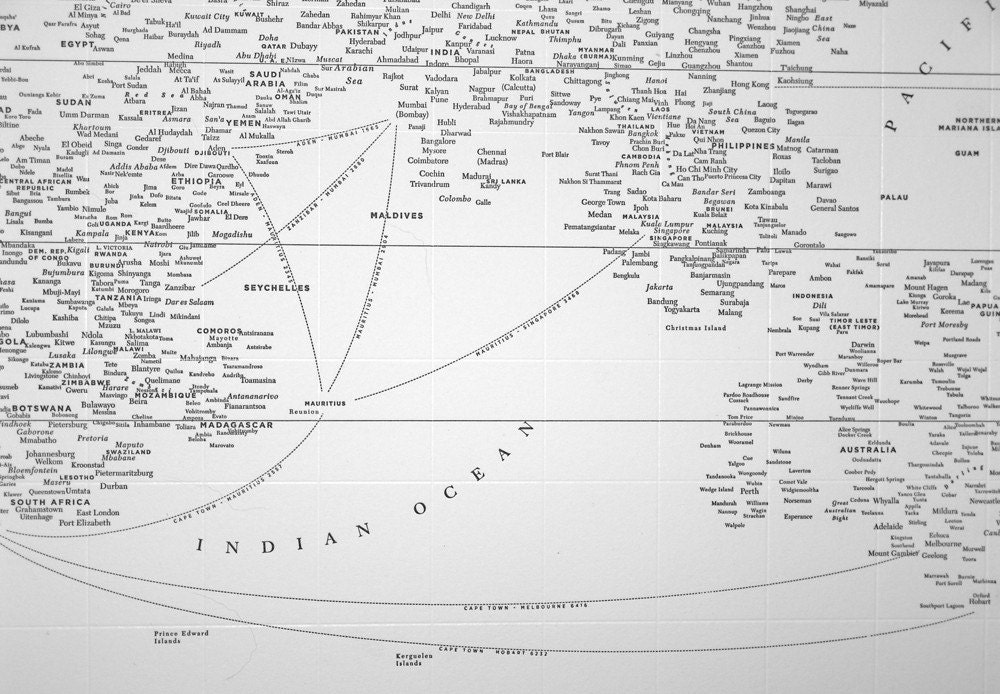This typographic world map, available on Etsy, is quite incredible and more than a little bit clever. Rather than drawing borders the countries are created using the names of cities, landmarks, and nations.


This typographic world map, available on Etsy, is quite incredible and more than a little bit clever. Rather than drawing borders the countries are created using the names of cities, landmarks, and nations.


I love instagram. It’s possibly my most used iPhone app. Almost all of my cafe reviews on thebeanstalker.com use it. And why not.

But one of the downsides of instagram is its lack of web presence. You don’t get a profile, you have to have the link for each photo you’ve uploaded from wherever you’ve uploaded it to (be it Facebook, Twitter, Tumblr, Flickr, etc) to get to the photo’s native location on the instagram server.
Instagram is rumoured to be working on a nice web interface. It’s coming. So they say. But in the meantime check out this neat little 3rd party service called webstagram. All you need is the person’s username and you’ve got a nice little instagram profile.
I just wrote a massive post on Venn Theology about literary theory and the Bible. You should read it, and comment (it is 2,500 words). Because this is something I’ve spent most of the semester so far thinking about, and wanting to argue about, with people who are big on single purposes for books of the Bible, and single “implied readers”…
But here’s a little bit I thought was more generally interesting. I reckon a lot of the Bible is written to persuade, and I think there’s a natural comparison between the Bible and press releases – which shapes the way I approach questions of rhetorical purpose. From that post (which I’d love you to read and comment on):
I want to suggest that much of the Bible, particularly the historic and prophetic books of the Old Testament, and the gospels, are just like Press releases. The case is harder to make for the New Testament pastoral epistles, where specific intended readers are mentioned. But letters to church groups, because they naturally contain people of different status (both spiritually and socially) are, again, just like Press Releases.
Press releases are, by their nature:
Those three elements become important when you set out to write a press release. Every line counts. But every line counts differently for different people. Joe Average may not care where the money for a project is coming from, but the small business who has given you $1,000 of their hard-earned wants to know that that cash is being put to good use. The Board of Directors don’t really care about how a project is going to effect an individual resident, but papers love that stuff. Because they like pictures and stories about people. But the one document is used to inform and persuade many readers, from many backgrounds. And that is wrapped up in the author’s intent. If the author writes with purpose. And I’d like to assume that the writers of the Bible fall into the category of writing with purpose. But I think our job is to assess each book of the Bible for a variety of purposes for a varied audience – not one purpose for one audience. Unless that purpose is specifically stated. But even then, it’s place in the canon suggests that God has different purposes for different people in different circumstances to the intended recipient. Right?
This is pretty funny.
There’s this old school universal cheat code from the days of the NES called the Konami Code.
Go to Mars Hill’s website and enter it – just hit the combo of keys above on your keyboard + enter – and you find an “Easter Egg.” Somebody there knows more about gaming culture than they’re letting on, because the code takes you to Driscoll’s ill-conceived rant about video games, posted and discussed here the other day.
H/T ChurchCrunch
This brings some of my favourite subjects together – typography, Helvetica and burgers. Delicious mix.

Via this Flickr set. There are more sandwiches there. But I love this one:

And this one:

Did you know that the ampersand (&) was originally meant to be an e and t joined together. From the Latin et? Did you know that typographers love the &? Did you know you can judge a font by its &?
If you answered “no” to any of those questions then you need to get your & on. So. Check out these & resources.
You can, using a little bit of CSS, serve up fancy &s to visitors to your webpage. Here’s how (and it’s the source of these graphics).
Here are the &s available on Mac…

& on PC…

You can also, if you’re technologically inclined, install some webfonts. This site has a bunch. Here’s a sample.
Sad, but true.

There’s a rude word that I redacted – you can see the original here if that floats your boat.
I’d add that if you’re a really popular news site, particularly in Australia, your front page is likely to feature salacious yarns about celebrities and their private lives, and a smattering of cleavage (or news reports from “fashion shows”). The SMH homepage currently features the word sex 11 times. News.com.au seven times. theage.com.au eight times. Brisbanetimes.com.au nine times. Crazy.
David Cook is the outgoing (and departing) principal at SMBC (Sydney Missionary and Bible College). He’s here today at QTC (Queensland Theological College) sharing his top ten tips for preaching (and other stuff).
Tip one: Learn to shake hands and greet somebody. By the name they give. If they give a surname go with Mr or Mrs. Use names. Don’t just say “hello”… the sound of one’s name is the “sweetest sound in the whole world”…
But that isn’t about preaching.
The relationship between the Big Question, the Big Idea and the Big Answer
Big Question -> Big Idea -> Big answer
Use the subject and the compliment – what is he talking about? What is he saying about that?
Turn the big idea into a big question.
The easiest answer for a preacher to give is to the “how” question – but “why” is much more important if you don’t want to breed superficiality. How to questions are good, but shallow.
John 3:16 case study
The subject looks like God (use the first and the last words) – but almost every passage is about God – so lets go with Eternal Life.
The Big Idea: Eternal life comes through Jesus, God’s gift of love.
Big questions: How can I have eternal life? Is death the end? What will happen when you die?
Format of a sermon
State the truth of the passage -> explain the passage -> illustrate the passage -> apply the passage.
If you illustrate first it’ll be without power. Explain first.
The Pyramid
At the bottom level you are summarising with verse references.
At the next level you are looking at the movements in the passage. Which determine the structure of the sermon.
Next. The dominant picture (from On teaching and preaching with creativity – “the human brain is a picture gallery, not a debating hall”).
Subject and compliment.
The Big Idea.
The tip is the Big Question.
Five Keys to Clarity
At what point in the process of meeting new people do you drop the “I have a blog” or “I’m a blogger” bombshell? Obviously we all blog for attention. Right.
I’m a little self-conscious these days because sometimes people talk to me about my blog(s), in front of people I’ve just met, or people who don’t know I blog, and those people respond in one of a few ways, none good, some will say “why didn’t you tell me you had a blog” or “I can’t believe you have a blog. You nerdo loser”… or then I just feel the need to go into sales pitch mode about why people should read my blog, or some sort of justification about why I blog, or that falsely humble “oh that old thing…” Although, like in the parable of the sower (awesome analogy for blogging) there are some people who become regular readers, who even comment some times, and I like that.
And if I just casually mention my blog(s), in conversation (usually in the form of “did you see on my blog” to somebody I know reads it, or “you should see this awesome thing I found and posted on my blog” to somebody I want to read it) in front of somebody who knows I have a blog and falls into that latter category (the “you nerdo loser” one) then they mock more.
Bloggers: how do you navigate those heady waters? Non-bloggers: how much do you want bloggers talking about their blogs in the real world? We all want people to read what we write right? And we all want to read interesting stuff online right? Why can’t we all just get along.
I’m guilty. Partially. Of taking the same iconic tourism shot as everybody else. Though I also learned this lesson back in my tourism marketing days – so I’m much more interested in taking photos of people, or odd angles, or trying to do something unique, than I am in taking the same picture that features on post cards you can buy for a dollar – though those do have a place if you’re on a study tour (hence their appearance in the albums from the Greece and Turkey trip we went on last year).
When an artist named Corinne Vionnet noticed that everybody in the world seems to take the same photos she put together this exhibition of overlayed photos of some of the wonders of the tourism world.
“Switzerland-based Corinne Vionnet is our guide to the world’s most famous landmarks, monuments millions have visited before. Her art is created not by acrylic, oil, or watercolor, each piece is made by combining hundreds of tourist photos into one. After conducting an online keyword search and sifting through photo sharing sites, this Swiss/French artist carefully layers 200 to 300 photos on top of one another until she gets her desired result.”
Including the Parthenon, on the Acropolis in Athens.

Here’s my shot from that spot.
This composite shot of New York is interesting too, just because it still has the twin towers.

I love the Oxford Comma. The comma that comes between and, and the word after and, or the comma before that or.
I think it improves clarity. And when I’m proof reading a non-Oxford user’s text I constantly have to resist the urge to plug them in.
The Oxford Dictionary’s entry on the Oxford Comma (linked above) says:
“It’s known as the Oxford comma because it was traditionally used by printers, readers, and editors at Oxford University Press. Not all writers and publishers use it, but it can clarify the meaning of a sentence when the items in a list are not single words…”
I actually think it improves clarity in all circumstances. Not just when you’re writing a sentence about a list of meal options. Like Pizza, fish and chips, and McDonalds. But before all final ands. It just looks nicer.
I love public speaking. I’m not one of those people who gets filled with dread standing up in front of a crowd. In fact, the bigger the crowd the better. I guess at that point I’m classically extroverted. It’s a rush. Preaching is the thing that excites me most about vocational ministry. It’s not that I think I’m good at it. I’m not. I’m not bad – this isn’t an exercise in false modesty. You’d hope with a journalism degree I’d be ok at stringing some words together. But there are a few things I struggle with. But this isn’t a post about today’s sermon.1
I’m wondering about the long term effects of the adrenalin rush I get every time I preach. I love it. For me it’s like sky diving or extreme sports. The act of getting up in front of people – regardless of what I’m actually saying. I love MCing stuff as well.
Will I get addicted to it? Is that why preachers sometimes travel the globe preaching? Does this pose long term risks to my health? Most importantly, I’m wondering how sustainable my Sunday afternoons are going to be with the post adrenalin crash. Man. What goes up sure comes down. By about 2pm I can hardly keep my eyes open. I go blank. All that energy that I gain in the morning as I get ready to preach (I reckon the adrenalin kicks in at about 8am when I’m preaching at a 9:30 service) drains out, and takes whatever reserves I have with it. I’m pretty sure the adrenalin is what gives other people preacher’s belly – though for some it’s doubtless channelled as fear rather than exuberance.
I’d love to know how others go on the adrenalin front – is the Sunday arvo crash a common thing? Not having a night service anymore seems like such a good innovation on the days I’ve preached in the morning.
1Today’s sermon was mostly good. The last little application bit felt a little tacked on, and I really wasn’t sure where to go once I’d established that I didn’t think the passage was about sexual ethics, but rather about seeking God’s kingdom. So I said that. I talked about commitment. I tied it to Jesus (which was easy because of Matthew’s genealogy). I compared the righteousness of Tamar with the unrighteousness of Judah. But blah. Blah. Blah. That’s how I felt about the last fifth of my talk.
My other little bit of self critique (and I’ll post the audio for this sermon when I get it) is that I’m much more engaging (in my opinion) when I’m illustrating and telling a story entirely in my own words, as I would naturally. And in most of these cases I leave the script behind. At times I feel like I suppress my personality a little in the writing of my talks and I end up cold and robotic rather than talking how I would normally talk. Actually, I don’t sound robotic, I sound like a journalist, not a real person. On the plus side, all the old ladies tell me I speak clearly and audibly. I don’t write an essay – I try to write the way I talk, but I suspect I haven’t beaten out the writing for TV part of my previos training. There’s something just not quite right. It’s like I’m preaching in black and white rather than colour too. For the most part. Or at least that’s how I feel. Feel free to chime in if you heard me this morning (or once you’ve listened to the audio).
Well. Time for an update. The other day I posted about this web deathmatch. Then it seemed like Anonymous had washed their hands of the initial threat. Anonymous claimed Westboro had set this up as a bit of a honey trap to harvest IP addresses from Anonymous users. I was going to post an update then, but then I thought I might ride it out a little longer. Plus, Westboro’s sites had been down for a little while.
Here’s the initial Anonymous response:
Because I figure if you hassle Anonymous for a while you’re going to wake the giant. Anonymous claim another hacker has taken down the sites. Now, Anonymous have acted – watch this…
This video is pretty funny. Anonymous hack Westboro live. During the interview. They put this message up on Westboro’s site.
Westboro think they’re “Mount Zion” and “prophets”… who can’t be shut up.
I’m sure this isn’t the end of this…
Going social with Facebook Comments
Hey. You can now comment on posts here using Facebook commenting. Check it out. You’ll love it. Or maybe you won’t. For those of you who still don’t have Facebook the traditional commenting options are still available… Try it, and let me know.
Also. Almost 100 people (99 at the moment) like St. Eutychus on Facebook. Are you one of them?
March 2, 2011